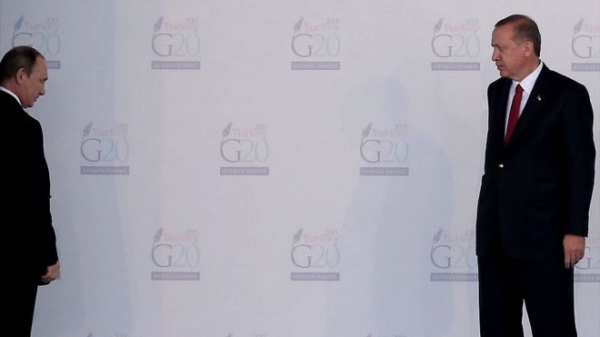© picture-alliance/AP Images/Y. ShimbunОсновные events of the summit of leaders of major economic powers took place on the sidelines of the event. Instead of the economy in Hangzhou mostly discussed politics.
The two-day summit of “big twenty” was completed in Chinese Hangzhou on Monday, September 5. Although formally the Central theme of the meeting of the heads of twenty leading economic powers were the international financial system, the main events took place on the sidelines of the event and was not related to the economy. The leaders deliberated on the sidelines of the summit on the political crises in the world. However, these informal meetings, mostly, did not bring concrete results.
In the end, perhaps the most discussed events of the summit were the various incidents like not filed the ramp to the plane American President Obama, ice cream donated by Putin the Chinese leader – or as the British Prime Minister Theresa may forgot to apply the hand to the Russian President during their first meeting.
Washington and Beijing are ready to improve the climate
The most substantive result of the summit in Hangzhou, was presented before the opening of the event. On arrival at the summit, XI Jinping and Barack Obama announced the ratification of the Paris climate agreement. China and the United States, the two largest Issuer of greenhouse gases that cause global warming. Both countries account for about 40% of all emissions. The Paris agreement provides for the obligations of States to reduce emissions. It will enter into force after it is approved by at least 55 countries responsible for 55% of global emissions.
Russia and US discuss Syria and Ukraine
Vladimir Putin and Barack Obama held a meeting that discussed ways of resolving the conflicts in Syria and Eastern Ukraine. The meeting of the two presidents lasted for about one and a half hours, but brought no breakthrough. Consultations on Syria also met Russian foreign Minister Sergei Lavrov and U.S. Secretary of state John Kerry, who managed twice to speak at the summit. However, their talks also ended inconclusively.
Merkel met with Erdogan for the first time after the coup in Turkey
Shortly before the opening of the summit in Hangzhou, German Chancellor Angela Merkel (Angela Merkel) held an informal meeting with Turkish President Recep Tayyip Erdogan. It was their first meeting after a verbal picks of Ankara with European leaders, followed by a wave of mass arrests in Turkey after a failed coup. They discussed relations between the two countries, further implementation of the agreement, the EU and Turkey for refugees and the continuing conflict in Syria. Negotiations, by words the press-Secretary of the German government, were productive – but no more.
Putin’s Conversation
Vladimir Putin tried to hold as many bilateral meetings. With Angela Merkel they are “very specifically” discussed implementation of the Minsk agreements, the war in Syria and the humanitarian situation in Aleppo, Syria, said the official representative of the government of Germany Steffen Seibert (Steffen Seibert).
Putin spoke with his French counterpart Francois Hollande, after which he announced in October at the Paris meeting of the “Normandy Quartet”, which again will be discussed the implementation of the Minsk agreements. And in the conversation of the Russian President Erdogan raised the issue of the withdrawal of the Moscow food embargo on Turkish goods. In addition, the parties approached the agreement on free trade.
And a bit of Economics
Absolutely no technical issues, the economy, the summit did not come. The countries of “twenty” has promised to ratify before the end of the year, the agreement on simplification of international trade procedures, supported the quota reform of the world Bank and the inclusion of the yuan in the number of reserve currencies of the IMF.
Finally, in a final communiqué was agreed nine key areas of structural reforms: promotion of openness to trade and investment; promote labor-market reforms, improve education and improvement of professional skills; promoting innovation; improving infrastructure; promoting competition and creating an enabling environment for business; improving and strengthening the financial system; promote fiscal reforms; improving environmental sustainability; promoting inclusive growth.
Author: Ilya Koval






